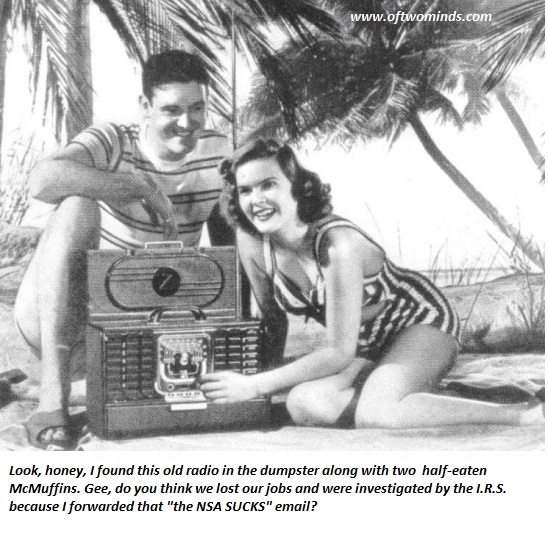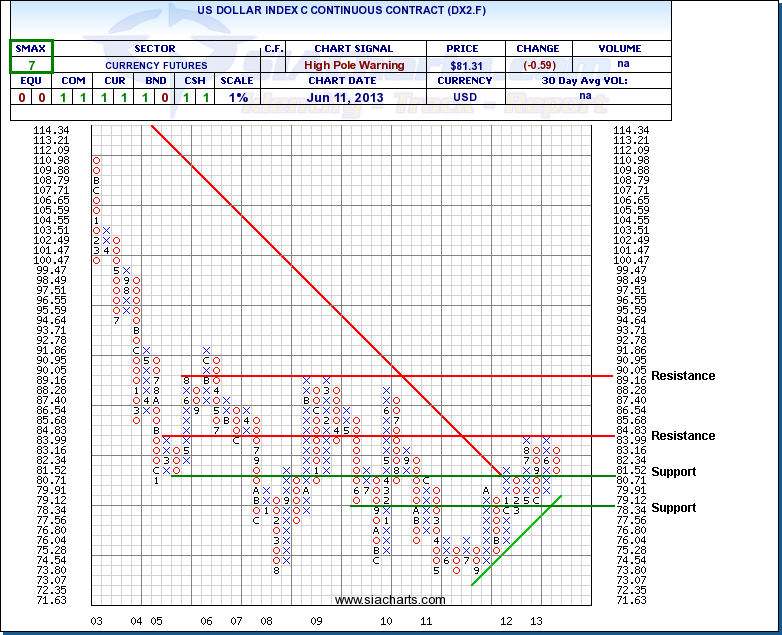submitted by Charles Hugh Smith from Of Two Minds
America's Enemies Now Using Carrier Pigeons and Invisible Ink Letters: the Absurdist, Tragicomic Narratives of Domestic Surveillance
If you know your electronic communication is being monitored, you start using couriers, carrier pigeons and invisible ink snail-mail--anything other than electronic communication.
The recent confirmation of programmatic domestic surveillance is rich with absurdist, tragi-comic narratives. Just to take the most obvious:
1. Is anyone dumb enough and/or credulous enough to believe "the bad guys" aren't aware of U.S. surveillance and electronic monitoring capabilities? Garsh, why did Osama bin Laden use couriers rather than his mobile phone?
Is anyone dumb enough and/or credulous enough to believe the bad guys think their communications within the U.S. or between non-U.S. and U.S. groups are safe from U.S. surveillance/monitoring because they really really trust the Bill of Rights to protect them?
Naivete about what the U.S. National Security State is capable of is highly correlated to which end of the drone strike you're on.
2. Why are Total Awareness surveillance/monitoring/data-capture programs considered news? All of this has been in the public-space media for years: exactly what is new? That a media-savvy young insider confirmed what a bunch of less media-genic outsiders have written about for years? Please re-read these stories if you missed them the first time--all are highly recommended:
Officials Say U.S. Wiretaps Exceeded Law (April 15, 2009, New York Times)
Top Secret America: A hidden world, growing beyond control (July 19, 2010, Washington Post)
Underscoring the seriousness of these issues are the conclusions of retired Army Lt. Gen. John R. Vines, who was asked last year to review the method for tracking the Defense Department's most sensitive programs. Vines, who once commanded 145,000 troops in Iraq and is familiar with complex problems, was stunned by what he discovered.
"I'm not aware of any agency with the authority, responsibility or a process in place to coordinate all these interagency and commercial activities," he said in an interview. "The complexity of this system defies description." The result, he added, is that it's impossible to tell whether the country is safer because of all this spending and all these activities. "Because it lacks a synchronizing process, it inevitably results in message dissonance, reduced effectiveness and waste," Vines said. "We consequently can't effectively assess whether it is making us more safe."
As he (former director of national intelligence, retired Adm. Dennis C. Blair) sat in the corner of a ballroom at the Willard Hotel waiting to give a speech, he mused about The Post's findings. "After 9/11, when we decided to attack violent extremism, we did as we so often do in this country," he said. "The attitude was, if it's worth doing, it's probably worth overdoing."
National Security Inc. (July 20, 2010, Washington Post)
The NSA Is Building the Country’s Biggest Spy Center (March 15, 2012, Wired Magazine)
Is there a legitimate security need to monitor the entire world's communications? There are reasonable arguments to be made for and against this proposition, but what's missing is the sense that the nation's citizenry should have a say in these policy decisions.
We're supposed to be satisfied that a handful of thoroughly corrupted-by-the-corporatocracy congresspeople have been spoon-fed a thin dribble of intelligence gruel and told to rubberstamp it in the name of democracy.
This calls to mind the notion that authorities inoculate the public with carefully measured doses of the operative master agenda and narrative. The idea that this concept (developed by French philosophers Roland Barthes and Jean Baudrillard) might apply to the recent surveillance revelations was introduced to me by Aengus Anderson, host of the excellent audio program series The Conversation.
By carefully releasing bits and pieces of the program, authorities inoculate the public against outrage or political action; the citizenry soon habituates to the master agenda and internalizes it to the point of self-management: we're spied upon for our own good.

3. The problem with this sort of intrusive power and technology is that such tools beg to be used. If the tool exists, it will eventually be used. The more powerful the tool, the stronger its draw upon the Superusers with access to its power.
That's the lesson of the I.R.S. investigation of targeted political groups: if the ability to target "people of interest" exists, people of interest will find themselves targeted.
I've been a "person of interest" at least twice, and it is a disconcerting state of being. I was placed on the "don't issue this guy a boarding pass without a security check" list, and no explanation was offered.
The entire process of being placed on the list for reasons unknown and getting my name removed was Kafkaesque; the no-fly list program struck me as a convoluted, ultimately worthless mess, just the sort of thing you'd expect from overlapping agencies, data bases, procedures, etc. One gets the impression that there is essentially zero oversight of the program's effectiveness.
Due to my associations with groups (the American Friends Service Committee) and individuals of interest, I became a "person of interest" to the F.B.I. back in 1971-72, when an enormous percentage of the agency's resources were devoted to investigating draft resistance and domestic anti-war activity. The dominance of this political resistance is our highest investigative priority agenda has long been well-documented; it only makes sense once you accept that political resistance is criminal.
In my case, the F.B.I. helpfully called me to tell me they knew where I lived, etc., and would I like to talk to them now at my house or tomorrow at their office? I chose tomorrow, at their office, with a witness.
Interestingly, I'd broken no laws; my associations were sufficient to suggest potential guilt. This justified investigation and whatever monitoring and data gathering were deemed standard procedure at that time. (I'm sure the F.B.I. agents got a good chuckle out of interrogating a frightened 19-year old kid.)
This is precisely the mindset that fueled the 1950s witch-hunts of suspected Communists: guilt by association.
People like to say "it can't happen here:" nice, except it's already happened here. The tools have just become more powerful and further distanced from oversight.
It's a small, effortless step from seeing exposure of the surveillance program as a crime to seeing those who question the program as a potential threat.










